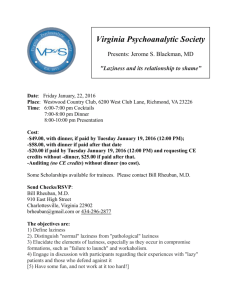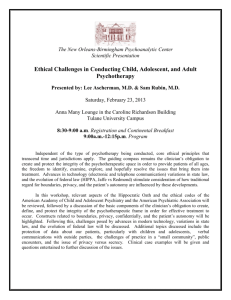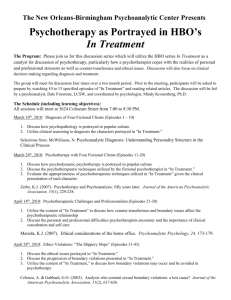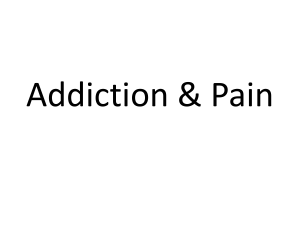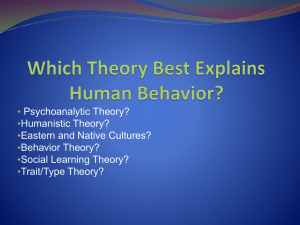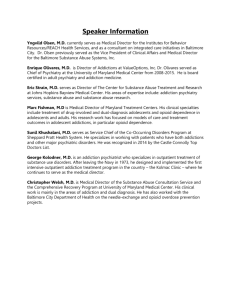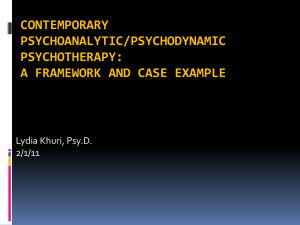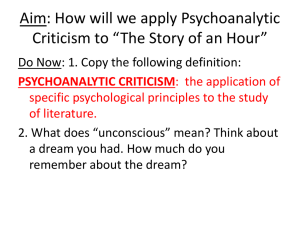November 20th, 2015 - Virginia Psychoanalytic Society
advertisement
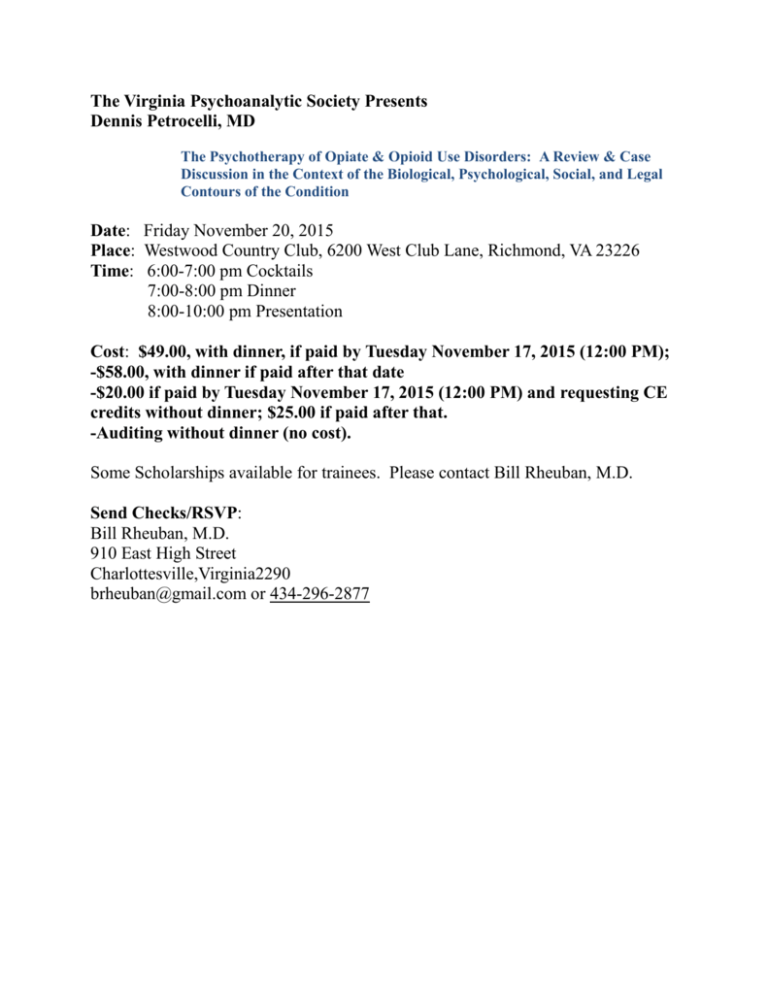
The Virginia Psychoanalytic Society Presents Dennis Petrocelli, MD The Psychotherapy of Opiate & Opioid Use Disorders: A Review & Case Discussion in the Context of the Biological, Psychological, Social, and Legal Contours of the Condition Date: Friday November 20, 2015 Place: Westwood Country Club, 6200 West Club Lane, Richmond, VA 23226 Time: 6:00-7:00 pm Cocktails 7:00-8:00 pm Dinner 8:00-10:00 pm Presentation Cost: $49.00, with dinner, if paid by Tuesday November 17, 2015 (12:00 PM); -$58.00, with dinner if paid after that date -$20.00 if paid by Tuesday November 17, 2015 (12:00 PM) and requesting CE credits without dinner; $25.00 if paid after that. -Auditing without dinner (no cost). Some Scholarships available for trainees. Please contact Bill Rheuban, M.D. Send Checks/RSVP: Bill Rheuban, M.D. 910 East High Street Charlottesville,Virginia2290 brheuban@gmail.com or 434-296-2877 The Psychotherapy of Opiate & Opioid Use Disorders: A Review & Case Discussion in the Context of the Biological, Psychological, Social, and Legal Contours of the Condition. The psychotherapy of opiate and opioid use disorders will be presented from the psychodynamic, rational/emotive, and mindfulness perspectives by way of vignettes from the presenter’s practice as well as any substance use disorder case vignettes offered by attendees. The current biological, social, and legal contexts of the disorder will be reviewed as they influence the treatment frame, transference and countertransference phenomena, and the selection of workable psychotherapeutic techniques. Objectives: • To understand the latest developments in brain research related to substance use disorders and how these developments inform clinical realities of cravings, relapse, and psychotherapeutic technique. • To understand how social and legal realities influence clinical experiences of shame, guilt, and transference and countertransference phenomena and how to approach these psychotherapeutically. • To replace the notion that persons with these disorders cannot be treated with psychotherapy with the knowledge of psychotherapeutic techniques that are an essential component of a comprehensive treatment plan. Bibliography: Articles: The 10 most important things known about addiction. Addiction 105:6-13 • Heroin Addiction – A Metabolic Disease. Dole & Nyswander. Arch Intern Med 120 Jul 1967. • Abnormal Resting-State Functional Connectivity of the Nucleus Accumbens in • Multi-year Abstinent Heroin Addicts. Journal of Neuroscience Research 93:1693–1702 (2015) • Medication-Assisted Therapies — Tackling the Opioid-Overdose Epidemic. This article was published on April 23, 2014, at NEJM.org • Vietnam veterans’ rapid recovery from heroin addiction: a fluke or normal expectation? Addiction 88:1041-1054 • Sociopathy as a Human Process. Arch Gen Psych Vol 32 1975 • Exploring compatibilities between acceptance and commitment therapy and 12-step treatment for substance abuse. Journal of Rational-Emotive & Cognitive-Behavior Therapy • Volume 18, Number 4, Winter 2000 • • • • • • • Books: Get Your Loved One Sober. Robert J Meyers, Ph.D., Brenda L. Wolfe, Ph.D. In The Realm of Hungry Ghosts. Gabor Maté, MD The Heart of Addiction, The Sober Truth, & Breaking Addiction. Lance Dodes, MD Relapse Prevention. G. Alan Marlatt, Ph.D. Beyond Addition. Jeffery Foote, Ph.D., Carrie Wilkens, Ph.D. Rational Steps to Quitting Alcohol. Albert Ellis, Ph.D. • • • Managing Addictions: Cognitive, Emotive, & Behavioral Techniques. F. Michler Bishop, Ph.D. Hungers and Compulsions: The Psychodynamic Treatment of Eating Disorders and Addictions. Jean Petrucelli & Catherine Stuart. Catch Them Before They Fall. Christopher Bollas Neurosis and Human Growth. Karen Horney, M.D. • • • • Books & Movies: A Scanner Darkly. Philip K. Dick. 1997 & A Scanner Darkly. Warner Independent Pictures. 2006 The Narcotic Farm: The Rise and Fall of America’s First Prison for Drug Addicts, & Video documentary available at: https://vimeo.com/91392115 • Music: The Bridge. Sonny Rollins. RCA 1962 • Continuing Education Information: This activity has been planned and implemented in accordance with the Essential Areas and policies of the Accreditation Council for Continuing Medical Education through the joint sponsorship of the American Psychoanalytic Association and the Virginia Psychoanalytic Society. The American Psychoanalytic Association is accredited by the ACCME to provide continuing medical education for physicians. The American Psychoanalytic Association designates this Live Activity for a maximum of 2.0 AMA PRA Category 1 Credit(s)™. Physicians should claim only the credit commensurate with the extent of their participation in the activity. IMPORTANT DISCLOSURE INFORMATION FOR ALL LEARNERS: None of the planners and presenters of this CME program have any relevant financial relationships to disclose. For further information, contact Eli Zaller, M.D. at ejzdewe@aol.com or 804-288- 3251. Up to 2.0 CEU's are available for Licensed Clinical Psychologists and Licensed Professional Counselors in accordance with the applicable requirements of the Virginia Board of Psychology. There is no extra fee beyond the cost of the meeting. Eligibility for credit is contingent upon the Virginia Psychoanalytic Society's receipt of the forms verifying attendance, as signed and validated by the monitor at the meeting. For further information, contact Margaret Duvall, Ph.D. at mlduvall@erols.com or 804-340-5290. Up to 2.0 CEU's are available for MSW's for this meeting from NASW VIRGINIA. The application costs are included in your registration fee. MSW CEU requests will be sent to NASW VIRGINIA by the Virginia Psychoanalytic Society. For further information, contact Susan Stones shstones@verizon.net or 757-6229852x15.
